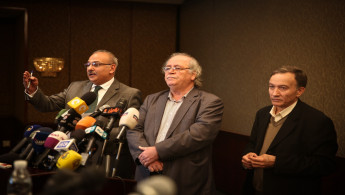Syrian opposition group boycotts Cairo peace talks
The Syrian National Coalition opposition group has announced it will boycott the "Cairo 2" talks aimed at resolving the Syrian crisis.
The SNC is recognised by 114 countries as the sole legitimate representative of the Syrian people authorised to negotiate in their name. It announced it had decided not to attend the Cairo 2 conference after Egypt invited individuals rather than representatives of parties to the talks.
Egypt gave the SNC equal status to other opposition groups and refused to invite the Syrian Muslim Brotherhood to the talks.
The Cairo 2 talks are to begin at the end of this month. It is expected that 200 opposition politicians, from a number of opposition groups, will be taking part.
| The vice-president of the SNC criticised the Cairo conference, saying the exclusion of any opposition group was unacceptable. |
The vice-president of the SNC, Hisham Marwah, criticised the Cairo conference, saying the exclusion of any opposition group was unacceptable. He called on the opposition groups not to give up the principles of the Syrian revolution and to unite to bring down the regime of Bashar al-Assad.
The SNC's rejection of the Cairo 2 conference came after it downgraded its representation at the Geneva consultations. It is now placing its hopes on the Syrian Conference in Riyadh, which the Gulf Cooperation Council (GCC) called for. The coalition immediately welcomed this initiative.
A series of failures
The first round of talks in Cairo and two recent conferences in Moscow did not produce any significant results.
Several of the participants announced the talks failed because Russia and Egypt depended on opposition groups and personalities with little support and no international recognition.
The Cairo 2 talks adopted the same approach, and this has led observers to believe they will suffer the same fate.
Qasim al-Khatib, a member of the preparatory committee of the Cairo 2 talks, told Turkey's Anadolu news agency that the conference would discuss a document for the future of Syria.
He added this document did not include any stipulation that Assad would remain in power. The document, he said, was "based on the principles of the Geneva declaration and looks into negotiations with the Assad regime for the transfer of power to a transitional government including representatives of the opposition and the regime, to preserve the Syrian state."
He said the goal was to preserve state institutions but not the regime, adding that "destroying everything to do with the past would doom Syria to perpetual chaos."
Egypt accused of pro-regime bias
| Egypt favours the regime over the opposition, Egypt's internal policies dictate its approach to the Syrian crisis. -Syrian opposition politician |
A Syrian opposition politician, who preferred not to be named, said: "Countries supportive of the Syrian regime have held several conferences for the Syrian opposition. They all have the same aim - to rehabilitate the head of the regime, so he can lead a transition period."
He said Egypt now favoured the regime over the opposition and that Egypt's internal policies were dictating its approach to the Syrian crisis.
Another Syrian opposition source, who preferred not to be named said that Egypt had lobbied for the opposition SNC to be refused attendance at the recent Arab League summit and for the Syrian regime, which has been suspended from the league, to be allowed to attend.
He said: "The Egyptian regime carried out a coup against the Egyptian revolution, and this makes it closer to the Syrian regime than to the Syrian revolutionary forces."
Sources have told al-Araby that the Riyadh conference would include representatives from the various sects of Syrian society, as well as all the political parties, armed factions, and the humanitarian and human rights organisations.
The conference will produce a memorandum of understanding detailing the formation of a transitional authority in which Assad will play no part, according to these sources. This authority will lead a transitional phase in Syria, and will distribute offices and authority according to quotas based on sect and political party.
The sources said that the memorandum of understanding will be similar to the Taif Agreement which ended the civil war in Lebanon.
This is an edited translation from our Arabic edition.



